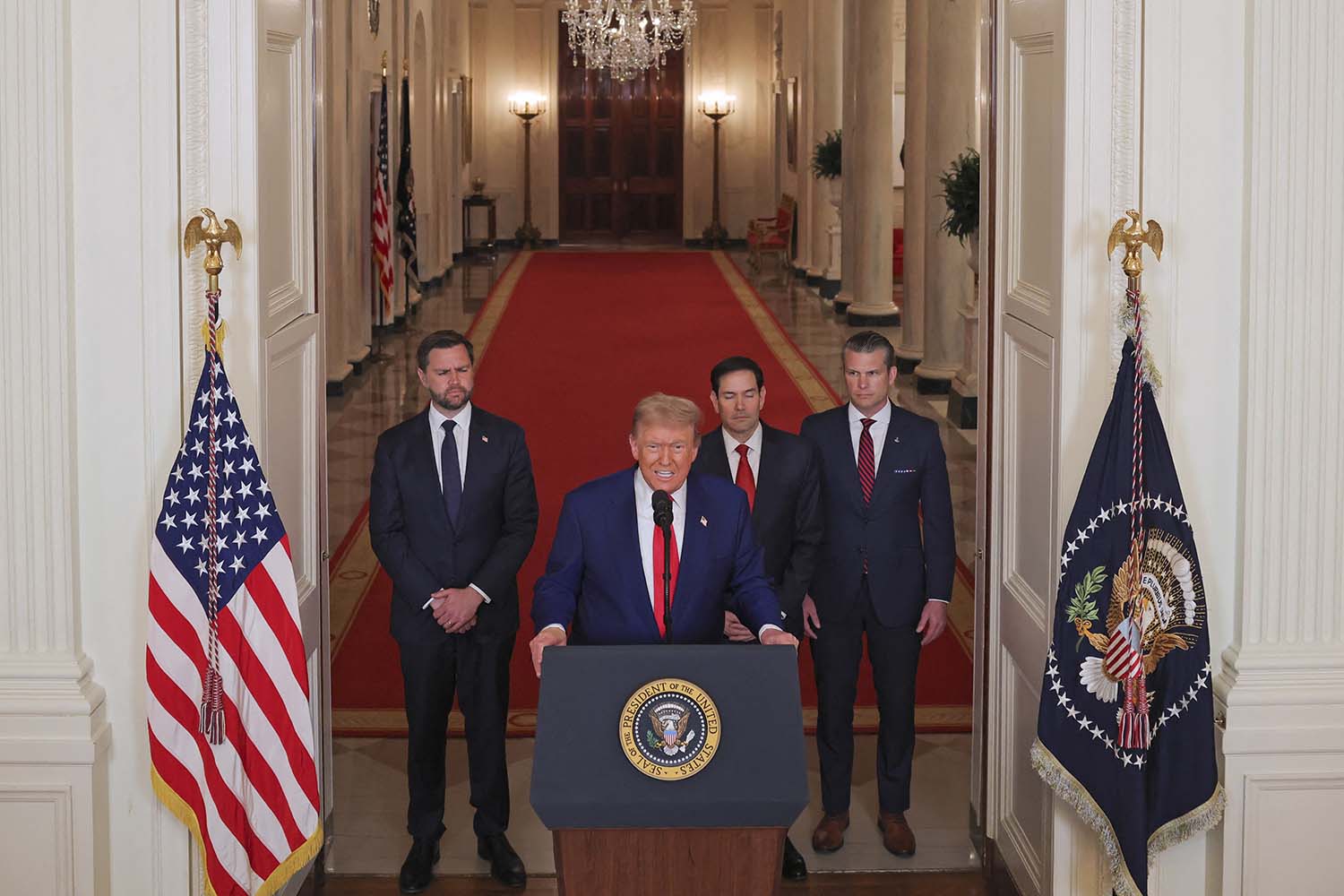The United States struck three nuclear sites in Iran early Sunday morning, with President Trump entering the war to stop the threat from “the world’s number one state sponsor of terror”.
Six B-2 stealth bombers dropped at least six bunker buster bombs on the Fordow nuclear site, which lies deep in a mountainside near Tehran. American warplanes and navy submarines also attacked two other sites, a uranium enrichment centre at Natanz and a nuclear fuel storage facility at Isfahan.
Addressing the nation from the White House on the biggest gamble to date of his presidency, Trump said that Iran’s key nuclear plants were “completely and fully obliterated”. The scale of the damage has not been independently confirmed.
“Our objective was the destruction of Iran’s nuclear enrichment capacity and a stop to the nuclear threat posed by the world’s number one state sponsor of terror,” Trump told the nation. I can report to the world that the strikes were a spectacular military success. Iran, the bully of the Middle East, must now make peace.”
“Remember, there are many targets left,” he continued. “Tonight’s was the most difficult of them all by far, and perhaps the most lethal, but if peace does not come quickly, we will go after those other targets with precision, speed and skill. Most of them can be taken out in a matter of minutes.”
In the address at 3am UK time, Trump said there would either now be peace or there will be “tragedy for Iran”, greater than seen in the last eight days of the conflict. The president had previously confirmed at 12.50am UK time that United States forces were carrying out the strikes.
There was no UK involvement in the US attacks. There had been previous speculation that the B-2 jets could use the US/UK joint military base at Diego Garcia before launching an attack, which would have needed British prime minister Sir Keir Starmer’s permission.
On Sunday morning Starmer called for Iran to return to the negotiating table. He said Sunday morning that Iran’s nuclear programme was a “grave threat to international security”.
“Iran can never be allowed to develop a nuclear weapon and the US has taken action to alleviate that threat,” he said. “The situation in the Middle East remains volatile and stability in the region is a priority. We call on Iran to return to the negotiating table and reach a diplomatic solution to end this crisis.”
The decision to directly involve the US in the war comes after more than a week of strikes by Israel on Iran that have moved to systematically eradicate the country’s air defences and offensive missile capabilities, while damaging its nuclear enrichment facilities.
Newsletters
Choose the newsletters you want to receive
View more
For information about how The Observer protects your data, read our Privacy Policy
Two separate flights of B-2 bombers departed Whiteman Air Force Base in Missouri, in the early hours of Saturday morning, supported by aerial refuelling tankers. Trump said Thursday that he would decide whether to take military action “within two weeks”.
The GBU-57 bombs reach the speed of sound and can penetrate deep into a target before exploding. They were believed to offer the best chance of destroying the Fordow facility, which is well protected and considered beyond the limit of Israeli munitions.
“A full payload of BOMBS was dropped on the primary site, Fordow,” Trump posted on Truth Social. “Fordow is gone.” About 30 Tomahawk missiles were fired against other military sites.
United States officials are reported to have contacted Iran through diplomatic channels overnight and said there was no intention of regime change.
Israeli Prime Minister Benjamin Netanyahu congratulated Trump on the military strikes, describing the action as a “bold decision”. Netanyahu said: “History will record that President Trump acted to deny the world's most dangerous regime, the world's most dangerous weapons.”
Iran’s Foreign Ministry said Washington had “betrayed diplomacy” with the strikes and that the US had “launched a dangerous war against Iran”. Writing in a post on X, Iran's foreign minister Seyed Abbas Araghchi condemned the attacks.
“The events this morning are outrageous and will have everlasting consequences,” he wrote. “Each and every member of the UN must be alarmed over this extremely dangerous, lawless and criminal behaviour.” He said Iran reserved all options to defend its sovereignty.
The Atomic Energy Organisation of Iran insisted its nuclear programme would not be stopped and reported no immediate signs of contamination at the three sites.
A senior White House official told the Reuters news agency that Trump considered the Iranian regime had no interest in reaching a nuclear agreement and the strikes were “the right thing to do”. He was also assured the operation had a high probability of success.
There were reports Sunday morning of a new wave of Iranian strikes against Israeli targets. Sixteen people were reported injured.
The Israeli-Iran war started on 13 June with Israeli aerial attacks targeting nuclear facilities, scientists and military commanders. The country’s state television reported this weekend that 400 people have been killed in the week-long conflict, with 3,056 injured. Iran’s airstrikes have so far killed 24 people in Israel.
Photograph by CARLOS BARRIA/POOL/AFP via Getty Images

